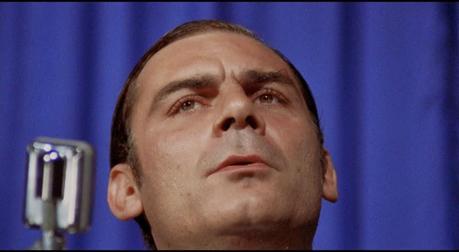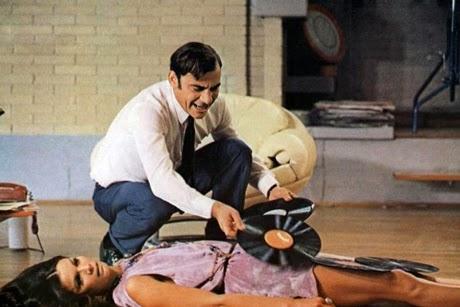 Elio Petri's Investigation of a Citizen Above Suspicion (1970) has a formidable reputation, enhanced for Anglosphere viewers by unavailability. Recently given a handsome Criterion release, Citizen is worth seeking out. Part thriller, part satire, it's a fascinating, somewhat uneven picture pointing up political fissions in Italy.
Elio Petri's Investigation of a Citizen Above Suspicion (1970) has a formidable reputation, enhanced for Anglosphere viewers by unavailability. Recently given a handsome Criterion release, Citizen is worth seeking out. Part thriller, part satire, it's a fascinating, somewhat uneven picture pointing up political fissions in Italy.The Chief (Gian Maria Volonte) murders his lover Augusta (Florinda Balkan) and leaves clues implicating himself. He's a veteran homicide detective promoted to the Political Division, tasked with rooting out subversive groups. He performs this task efficiently - it helps that one witness (Sergio Tramonti) to Augusta's murder is a Communist. The Chief's so well-regarded that his colleagues, even eyewitnesses disregard incriminating evidence. How could such a respected man be a murderer?
Investigation provides a caustic satire of Italian political ferment. Petri's depiction borders on surreal, as when police detectives obsess over decline in Stalinist wall graffiti. We're reminded of Z's junta blaming sunspots on Communism. Yet it's no laughing matter: suspects are beaten, entrapped, interrogated without legal counsel, leftists arrested without cause. The Chief encourages men to surrender as "good citizens" and gives a frothing speech boasting that "repression is civilization!" Like other leftist filmmakers, Petri equates "law and order" rhetoric with fascism.
Petri mixes the social commentary with a twisted procedural. Like a depraved Hitchcock villain, the Chief's grimly determined to be captured. He plants evidence, feeds stories to a reporter (Fulvio Grimaldi) and even browbeats a man (Salvo Randone) into fingering him as the murderer! There's a method to this madness: the Chief earnestly wishes to prove the reliability of police, hence Italy's institutions, so rocked by corruption and bad press. Too bad he underestimates his colleagues' (indeed, society's) eagerness to save face.
Investigation's weakest leg is the murder itself. Petri explores the Chief's relationship with Augusta via flashback: she asks him to reenact murders with her, presumably planting an idea in the Chief's head. Yet since the Chief's only seen fooling about with Augusta in these scenes, it's hard to grasp how he developed his plot. There's a sloppiness tying these storylines together, with an ending that's decidedly unsatisfying.
 Petri explores this with slick photography and editing. Viewers relish the gauche, frilly interior of Augusta's apartment, the police station's modernist façade with offices like a catacomb. Petri seamlessly intersperses flashbacks and interior monologues for a fast-moving thriller. Ennio Morricone's playful score, mixing mandolins and twanging Jew's harp, provides another highlight.
Petri explores this with slick photography and editing. Viewers relish the gauche, frilly interior of Augusta's apartment, the police station's modernist façade with offices like a catacomb. Petri seamlessly intersperses flashbacks and interior monologues for a fast-moving thriller. Ennio Morricone's playful score, mixing mandolins and twanging Jew's harp, provides another highlight.Gian Maria Volonte channels his savage charisma into a memorable monster. The Chief could be ridiculous but Volonte plays him absolutely straight. He's an intimidating cop, smug demagogue, perverse lover and a remorseless murderer. Volonte gives an electric turn, providing both fright and black humor, providing a twisted antihero who's more pathetic than frightening.
Florinda Balkan (Royal Flash) gets the key role as the Chief's lover and victim. Augusta isn't entirely credible: she's not given character beyond kinkiness, though Balkan's performance (and attractiveness) makes up for a lot. Salvo Randone gets laughs as a reluctant witness with Sergio Tramonti and Arturo Dominici in other key roles. The other officers play a Greek chorus to the Chief's grandstanding.
Investigation of a Citizen Above Suspicion makes a strong impression. It fits comfortably alongside that era's best political thrillers, disquieting yet darkly funny.

